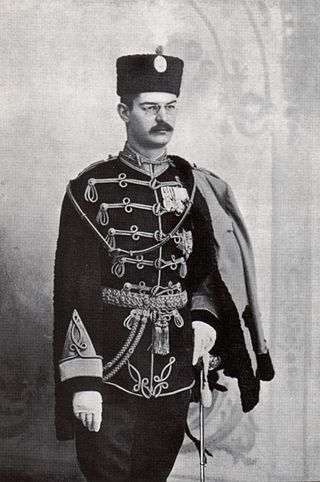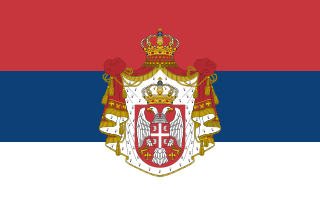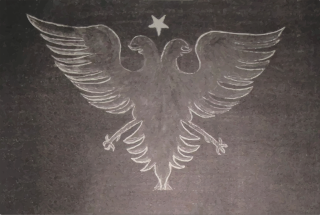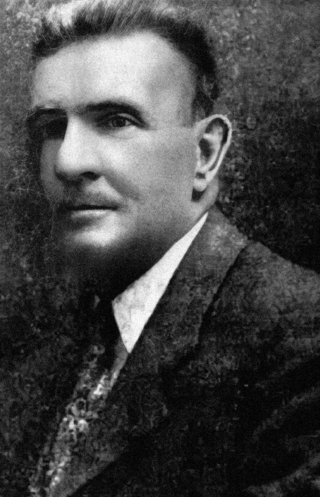Related Research Articles

Alexander I reigned as the king of Serbia from 1889 to 1903 when he and his wife, Draga Mašin, were assassinated by a group of Royal Serbian Army officers, led by Captain Dragutin Dimitrijević.

The flag of Albania depicts a silhouetted black double-headed eagle in the center of a red background. The red stands for bravery, strength, valour and bloodshed, while the Eagle – traditionally the symbol of Albanians – represents the sovereign state of Albania. The flag was established as the national flag of Albania when the country gained its independence from the Ottoman Empire in 1912.

Isa Boletini was an Albanian revolutionary commander and politician and rilindas from Kosovo.

Bajram Curri was an Albanian chieftain, politician and activist who struggled for the independence of Albania, later struggling for Kosovo's incorporation into it following the 1913 Treaty of London. He was posthumously given the title Hero of Albania.

The Kingdom of Serbia was a country located in the Balkans which was created when the ruler of the Principality of Serbia, Milan I, was proclaimed king in 1882. Since 1817, the Principality was ruled by the Obrenović dynasty. The Principality, under the suzerainty of the Ottoman Empire, de facto achieved full independence when the very last Ottoman troops left Belgrade in 1867. The Congress of Berlin in 1878 recognized the formal independence of the Principality of Serbia, and in its composition Nišava, Pirot, Toplica and Vranje districts entered the South part of Serbia.
Džemijet was a political party of the Muslim population in the Kingdom of Serbs, Croats, and Slovenes. It represented Albanians, Slavic Muslims and Turks in what was then "Southern Serbia". It was formed in August 1918 and officially constituted in Skopje in late 1919. The party participated in the 1920 and 1923 elections, in which it elected 8 and 14 representatives respectively. In January 1925 the party's leader Ferhat Draga, an Albanian nationalist who had previously served as mayor of Mitrovica, was arrested and soon after the party was disbanded.

The Principality of Albania was a short-lived monarchy in Albania, headed by Wilhelm, Prince of Albania, that lasted from the Treaty of London of 1913 which ended the First Balkan War, through the invasions of Albania during World War I and the subsequent disputes over Albanian independence during the Paris Peace Conference of 1919, until 1925, when the monarchy was abolished and the Albanian Republic declared.

Mustafa Merlika-Kruja was one of the signatories of the Albanian Declaration of Independence. He was Prime Minister of Albania during the Italian occupation from December 4, 1941, to January 19, 1943.

The Albanian Declaration of Independence was the declaration of independence of Albania from the Ottoman Empire. Independent Albania was proclaimed in Vlorë on 28 November 1912. Six days later the Assembly of Vlorë formed the first Government of Albania which was led by Ismail Qenali and the Council of Elders (Pleqnia).

Babë Dud Karbunara, born Jorgji Karbunara was an Albanian teacher and politician. He was one of the signatories of the Albanian Declaration of Independence.

Abdyl Aziz Vehbi Dibra Agolli was an Albanian Islamic scholar and politician. He served as the first grand mufti of the Muslim Community of Albania.

Mehmet Nexhip bej Draga was an Albanian politician who was an important figure of the Albanian National Awakening.

The Albanian Vilayet was a projected vilayet of the Ottoman Empire in the western Balkan Peninsula, which was to include the four Ottoman vilayets with substantial ethnic Albanian populations: Kosovo Vilayet, Scutari Vilayet, Manastir Vilayet, and Janina Vilayet. In some proposals, it included the Salonica Vilayet as well. The creation of the Vilayet was confirmed in September 1912, but negotiations were interrupted a month later in October by the beginning of the First Balkan War. Plans for an Albanian Vilayet were lost with the Partition of Albania.

The All-Albanian Congress was a held in Vlorë on November 28, 1912. Congress participants constituted the Assembly of Vlorë which established Albanian Provisional Government and elected Ismail Kemal as its president.
The Assembly of Vlorë was an Albanian assembly constituted during the All-Albanian Congress in Vlorë, on November 28, 1912.

The High Council of Regency was a political collegial body that served as the de facto head of state of Albania in two separate time periods:

Independent Albania was a parliamentary state declared in Vlorë on 28 November 1912 during the First Balkan War. Its assembly was constituted on the same day while its government and senate were established on 5 December 1912.
The Elderly Assembly was a senate of Albania which independence was declared on 28 November 1912 in Vlorë. The senate was established on the 4 December 1912 by the Assembly of Vlorë. It was composed of 18 members of the assembly and had advisory role to the government of Albania.

Ferhat Bey Draga (1880–1944) was a noted Kosovo Albanian politician during the Balkan Wars and World War I and Axis collaborator during World War II.
The Taksim meeting alternatively known as the Taksim Plot and less commonly as the Taksim Assembly was a secret meeting held in January 1912 by Albanian nationalist deputies of the Ottoman parliament and other prominent Albanian political figures. The event gets its name from Taksim Square because of the location of the house where it was held. The meeting was organized on the initiative of Hasan Prishtina and Ismail Qemali, Albanian politicians, who invited most of the MPs of Albanian origin and aimed at launching an armed general uprising in Albanian territories against the central government headed by the Committee of Union and Progress (CUP). The meeting followed two other Albanian uprisings of 1910 in the Vilayet of Kosovo and 1911 in the mountains of upper Shkodra. The Taksim meeting resulted in an uprising the same year, with armed uprisings in Shkodër, Lezhë, Mirditë, Krujë and other Albanian provinces, which exceeded the organizers' expectations. The biggest uprising was in Kosovo, where the rebels were more organized and managed to take over important cities like Prizren, Peja, Gjakova, Mitrovica and others.
References
- ↑ "History of Albanian People" Albanian Academy of Science. ISBN 99927-1-623-1
- ↑ Schmidt-Neke, Michael (1987). Enstehung und Ausbau der Königsdiktatur in Albanien, 1912-1939. Oldenbourg Verlag. p. 321. ISBN 9783486543216 . Retrieved 6 October 2012.